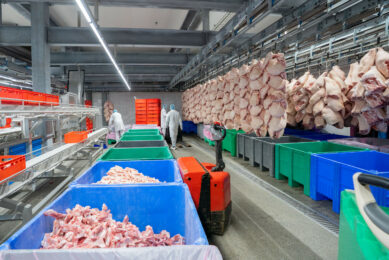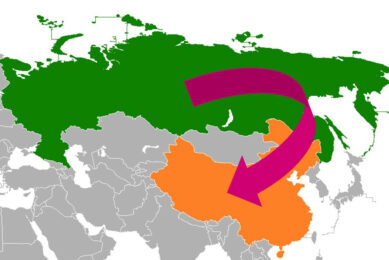Alibaba: Artificial intelligence inside Chinese pig farms

Chinese E-commerce giant Alibaba is introducing artificial intelligence technology for inside pig farms, like e.g. machine vision, voice recognition and temperature sensors.
As China’s largest news network Xinhua reported, a new deal worth millions of yuan has been signed between livestock farming companies the Sichuan Tequ Group, the Dekon Group and Alibaba, China’s technology giant.
This united approach has the goal of identifying and predicting fertility by analysing swine behaviour. The system should be able to keep a record of every single pig, including their breed, age in days, diet, weight and movement.
Helping sows to farrow 3 more piglets/year
The system is said to be able to help each sow give birth to 3 more piglets per year and reduce the mortality rate by around 3%, according to an early-stage experiment.
Tequ Group’s chief information officer, Zhang Haifeng, told Xinhua: “If you have 10 million pigs to raise, you can barely count how many piglets were born on a daily basis when the due date comes.”
Alibaba’s artificial intelligence technologies can automatically record the number of births and tell if a sow can give a natural birth or not. For example, the technology can locate and rescue a troubled piglet by analysing its screams to see if it is being pressed too tight by its mother, Mr Zhang said.
Machine vision technology for tracking pigs
The new machine vision technology uses overhead cameras to track pigs and identify them from tattoo marks on their backs. The basic system will be able to count pigs and piglets but more sophisticated systems are on the way, according to Alibaba.
In the future, the company hopes to be able to read temperature levels generated by pigs via infrared sensors and combine this with records of how much each pig is moving each day. With this raw data to hand the artificial intelligence system will be able to estimate the health of individual animals.
Alerts when piglets are being crushed
There are also developments coming using connected ‘voice recognition’ technology which can, for example, alert farmers when piglets are being crushed by their mothers by listening out for young pigs squealing. Alibaba claims this system alone will lower the death rate for piglets by 3% annually. A similar approach was launched by Swinetech on the US market last year.
Another voice use will try to monitor the spread of disease by recording the sounds of pigs coughing. This latest technology is already in trial use on some of China’s biggest pig farms. A comparable strategy has been in existence in Europe for some time through the company Soundtalks.
Bringing down husbandry costs
Zhang Sheng, big data expert and head of the programme with Alibaba Cloud, told Xinhua, “On one hand, we hope to bring down husbandry costs and achieve agricultural reform. On the other hand, we’d like to translate artificial intelligence technology into safe, tasty pork.”
The artificial intelligence programme featuring pig farming is just one part of Alibaba’s ‘ET Brain Plan’, which has already been applied in fields such as civil aviation, transportation, environment and medical service.











